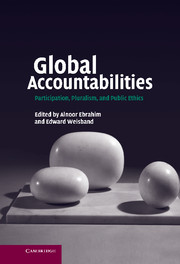Book contents
- Frontmatter
- Contents
- List of tables
- List of figures
- Acknowledgments
- List of contributors
- 1 Introduction: forging global accountabilities
- Part I Public accountability: participatory spheres from global to local
- 2 Multilateralism and building stronger international institutions
- 3 Global financial governance and the problem of accountability: the role of the public sphere
- 4 Citizen activism and public accountability: lessons from case studies in India
- Part II Experiments in forging NGO accountability: mutuality and context
- Part III Reflective accountability: new directions for participatory practices
- Part IV Global accountability frameworks and corporate social responsibility
- Index
- References
3 - Global financial governance and the problem of accountability: the role of the public sphere
Published online by Cambridge University Press: 22 September 2009
- Frontmatter
- Contents
- List of tables
- List of figures
- Acknowledgments
- List of contributors
- 1 Introduction: forging global accountabilities
- Part I Public accountability: participatory spheres from global to local
- 2 Multilateralism and building stronger international institutions
- 3 Global financial governance and the problem of accountability: the role of the public sphere
- 4 Citizen activism and public accountability: lessons from case studies in India
- Part II Experiments in forging NGO accountability: mutuality and context
- Part III Reflective accountability: new directions for participatory practices
- Part IV Global accountability frameworks and corporate social responsibility
- Index
- References
Summary
Recent developments concerning the international financial architecture have drawn attention to the problem of accountability within the structure of global financial governance. Some progress has been achieved in outlining the scale of the problem in terms of multilateral economic institutions such as the International Monetary Fund (IMF) and World Bank (see Woods, above, ch. 2). But little progress has been made with regard to the vexed question of how to address – either conceptually or practically – the problem of accountability in the myriad of other institutions actually involved in global financial governance. This is unsurprising. Most of the institutions and agencies involved in global financial governance are either national in scope or less formalized in their levels of institutionalization than are the IMF and World Bank. Moreover, they are by their very nature highly specialized agencies concerned with technical issues that require a certain level of expertise before meaningful oversight can be achieved. In order to advance lines of accountability in the absence of traditional democratic links between decision-making institutions and the public, I argue that accountability has to be better internalized within the context of a strengthened global financial public sphere, where norms of inclusion and publicness can be established and instantiated.
Accountability as a ‘problem’
Accountability within the broader structure of financial governance needs to be problematized precisely because of the way it forms part of the general ensemble of governance concerns.
- Type
- Chapter
- Information
- Global AccountabilitiesParticipation, Pluralism, and Public Ethics, pp. 45 - 64Publisher: Cambridge University PressPrint publication year: 2007
References
- 1
- Cited by

